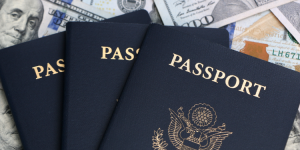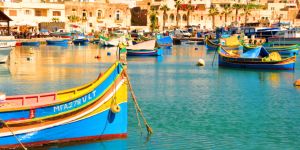
Today, we are looking into digital nomad visas that have minimal requirements. This means that even if you are just starting out in an office-free adventure and still developing your client base, you may be able to find a stable temporary base with digital nomad perks.
What is a digital nomad visa?
A digital nomad visa permits remote workers to live in another country temporarily while continuing their remote jobs. In most cases, while on a digital nomad visa, they cannot seek employment locally.
A nomad visa is typically valid for six months to a year and can often be extended once or twice.
These types of visas are meant for those who are seeking a temporary stay in a country and do not plan to build a career locally or apply for permanent residence.
Bermuda
Bermuda introduced its digital nomad visa program, the Work from Bermuda Certificate, in the summer of 2020. Under the new visa, nomads can stay on the island for up to 12 months – and are allowed to bring their dependents with them. And there is no minimum income requirement.
Why Bermuda?
Bermuda is a small island off the coast of North America. With excellent Wi-Fi and well-equipped coworking spaces in the island's capital, Hamilton, digital nomads can easily find cozy spots to establish their daily work routines. Furthermore, after a productive day, you can unwind at serene beach clubs.
Although Bermuda has a distinct tropical charm, it also offers a touch of business-oriented sophistication that you may not come across on other idyllic islands. This can be a big plus for digital nomads seeking a balanced blend of productivity and networking and a relaxed island lifestyle away from skyscrapers and traffic jams.
What to consider
Before you finalize your plans to move to Bermuda on a digital nomad visa, make sure you are duly aware of the island's high cost of living. Bermuda relies on imports for virtually everything and customs duties are applied in addition to shipping expenses. The cost of living in Bermuda is, on average, approximately 85.5% higher than in the United States.
Ensure you have the financial resources to sustain a comfortable lifestyle on the island for a year. On the positive side, visa holders are exempt from income tax in Bermuda, which is a substantial advantage for high earners.
Brazil
Brazil officially opened its doors to digital nomads and remote workers in 2022 with the introduction of the Brazil digital nomad visa. This temporary permit is initially valid for one year, with the option to renew it for an additional year. This visa is designed for remote workers and self-employed individuals engaged with foreign companies while staying in the country. The visa also allows applicants to bring along their immediate family members. The minimum required income is $1,500/month or $18,000 in a bank account.
However, it is important to understand that the Brazil digital nomad visa does not lead to permanent residency in Brazil.
Why Brazil?
Brazil has a vibrant digital nomad community – so you will have lots of options for both socializing and networking. Other attractions include breathtaking beaches, the magnificent Amazon rainforest, the lively Rio de Janeiro carnival, and delectable cuisine. Moreover, Brazil is a magnet for adventure seekers with lots of options, from exploring the lush Amazonian forests to ascending the iconic Christ the Redeemer statue.
What to consider
According to World Bank data reported by NPR, income inequality in Brazil is a pressing concern, ranking eighth-worst globally and standing as the most severe outside of Africa.
This socioeconomic disparity creates opportunities for criminal organizations to exploit the significant population living in poverty, often enticing them into illicit activities such as drug trafficking, as Brazil plays a role in international drug routes.
As a consequence, Brazil grapples with a considerable amount of violent crime. According to United Nations statistics, the country's homicide rate is 27.4 per 100,000 residents. Although it marks a decline from previous years, it remains significantly higher than the global average of 5.8.
Incidents of robbery, muggings, and pickpocketing are relatively common, emphasizing the importance of exercising caution when navigating various regions. It's advised to avoid visiting favelas (shanty towns) in cities, where crime tends to be more prevalent.
Columbia
The Colombia Digital Nomad Visa came into effect in October 2022. It is meant for remote workers, self-employed individuals, or employed professionals who render services to foreign companies. The visa is typically issued for up to two years, and it has a minimum income requirement of $700/month.
Why Colombia?
Colombia offers a diverse range of experiences. If you're craving tropical weather and beautiful beaches, you will probably prefer the coastal city of Cartagena. For a cooler, more urban atmosphere, consider the capital, Bogota. And if the bustling city life is your preference, don't miss Medellin. Moreover, in addition to low income requirements and processing fees, Columbia has a very affordable cost of living.
What to consider
Colombia has a history of political instability, armed conflict, and drug-related violence. While major cities like Bogotá, Medellín, and Cartagena have become safer in recent years, some rural and border areas may still experience sporadic violence.
Mauritius
Mauritius, the tropical African island, has recently introduced the Mauritius Premium Visa, extending a warm welcome to remote workers and virtual professionals. Those who choose to visit or work from this picturesque destination will have the opportunity to immerse themselves in a unique culture and witness some of the most vibrant natural landscapes on Earth.
The eligibility criteria for the Premium Visa are quite flexible, and for an additional fee, you can also apply for nomad visas for your dependents. The best thing about the Premium Visa is that the application process is remarkably quick — you will get approval within 48 hours. The minimum income requirement for this visa is $1,500/month.
Why Mauritius?
Mauritius is becoming a top choice for digital nomads thanks to its stunning natural beauty, reliable internet, safety, and diverse culture. English proficiency and tax benefits make it even more appealing, while its favorable time zone and quality of life enhance the experience for remote workers.
What to consider
While English is widely spoken, it's essential to be mindful of the local culture and customs, as respect for traditions is highly valued. Mauritius has a rich tapestry of religions, with Hinduism, Islam and Christianity being the predominant faiths.
Costa Rica
Digital nomads can now move to Costa Rica under the new visa initiative that allows them to extend a 90-day tourist visa to a full year, with the possibility of renewing for an additional year. The Costa Rica Digital Nomad Visa (DNV) was announced in October 2021, and the new visas have been officially issued since July 2022. The minimum income requirement for this visa is $3,000/month ($4,000/month with dependents).
Digital nomads who participate in this program enjoy various perks, including exemption from income taxes, the opportunity to establish a national bank account in Costa Rica, and the validation of their home country's driver's license. Furthermore, they are exempt from customs duties on telecommunications and essential electronic devices required for remote work.
Why Costa Rica?
Costa Rica offers exceptional connectivity, allowing digital nomads to easily maintain their work communication with international clients and employers.
The country's strategic geographic location, favorable climate, timezone compatibility, robust air travel options, and the rich tourism experience collectively make Costa Rica an alluring destination for digital nomads.
What to consider
While generally more affordable than in some Western countries, the cost of living in Costa Rica, particularly in popular expat areas, can be higher than in other Central American countries. Housing, imported goods, and certain services can be relatively expensive.
Cape Verde
Comprising seven captivating islands in the Atlantic Ocean, Cape Verde attracts digital nomads with its serene beauty and cultural diversity. Cabo Verde introduced its digital nomad visa, known as the Cabo Verde Remote Working Program, in December 2020. This initiative grants temporary residence to remote workers for six months, with the option to renew.
One of the best things about the Cape Verde digital nomad is its accessibility: applicants only need to sustain an average bank balance of $1,500 over the preceding six months.
Why Cape Verde?
The islands boast a diverse landscape with breathtaking beaches, rugged volcanic terrain, lush green valleys, and serene coastal towns, providing an inspiring backdrop for remote work. With a relatively lower cost of living, it's possible to enjoy a comfortable lifestyle without breaking the bank. Cape Verde's cultural diversity, influenced by Africa, Europe, and South America, creates a vibrant and welcoming atmosphere.
What to consider
Cabo Verde has a unique blend of African, European, and Brazilian influences, which is reflected in the country's culture and history. The country benefits from robust subsea internet connections through two primary links, one originating from Europe and the other from the USA. Additionally, a nationwide fiber optic infrastructure expansion is being implemented as well.
Cabo Verde (Cape Verde) is generally considered a safe destination for travelers, including digital nomads. It has a relatively low crime rate compared to many other countries, and violent crime is uncommon. However, like anywhere else, it's essential to exercise common-sense precautions to ensure your safety.
Spain
Spain, renowned for its exquisite wine, cheese, and tapas, welcomed digital nomads (officially) in 2022. Under the new arrangement, self-employed or those working for a foreign company can now reside in Spain. The nomad visa is initially valid for one year and can then be renewed for a three-year residence permit, which can also be renewed for an additional two terms. The minimum income requirement is €2,160/month or €25,920/annually.
Why Spain?
With its rich cultural heritage, vibrant cities, and diverse landscapes, Spain is an enticing destination for digital nomads. From the bustling streets of Barcelona to the historic charm of Seville, Spain offers an array of cities to choose from, each with its own unique character. On top of that, you get a secure residency in the European Union and the option to travel to other countries within the Schengen area visa-free.
On the day-to-day, Spain offers a robust infrastructure, including high-quality internet connectivity and a reliable transportation system. The country's pleasant Mediterranean climate further enhances its appeal.
What to consider
The cost of living in Spain, as an EU country, is generally higher than some of the other countries on our list. Additionally, note that non-residents on a digital nomad visa are also required to pay tax at a rate of 24% tax rate (applicable for incomes up to €600,000 per year).
Portugal
Nestled beside Spain on the Atlantic Coast, Portugal may appear small on the map, but it has become a compelling destination for digital nomads. One of the key attractions is its affordable and accessible temporary digital nomad visa. Under the temporary visa, digital nomads can stay in Portugal for one year, after which time they have the option to renew their residency for up to a total of five years. Applicants need a minimum income of at least €3,040/month and a bank statement with at least 12 minimal salaries (€36,480).
Why Portugal?
Portugal's stunning landscapes, rich history, and vibrant culture provide an ideal backdrop for work and exploration. From the picturesque streets of Porto and Lisbon to the historical sights of Sintra and the coastal beauty of Faro, Portugal is a diverse tapestry of destinations.
Compared to many other Western European countries, Portugal boasts a relatively low cost of living, making it easier for digital nomads to maintain a comfortable lifestyle. The country's warm climate, delicious cuisine, and friendly locals further enhance the overall experience for remote workers.
After residing in Portugal for five years, provided they learn Portuguese and integrate into the local community and culture, digital nomads can potentially apply for Portuguese citizenship.
What to consider
Note that paperwork in Portugal takes time. This means that processing time for your digital nomad visa application may take longer. Another thing you may want to take into account is that there is no central heating in Portugal and the winter months of December and January can get quite cold.
To sum up
If you are a digital nomad looking for accessible relocation options, you may be pleased to know that the list of countries offering residency to remote workers is constantly expanding. Keep an eye out for new digital nomad visas and evaluate your options carefully. Key things to consider include minimal income requirements, cost of living, taxation, internet connection speeds, and, of course, safety.




















Comments